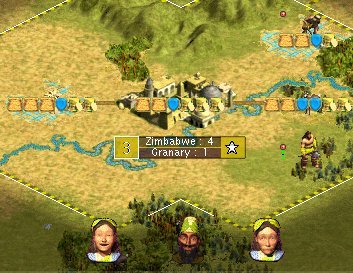Granaries are almost never worth it. Here's a comparison of choices in the early game:
#1
Cost of granaries - 60 shields 1 gold per turn
with +2 food city grows in 5 turns
#2
Cost of new city- settler + spearman 50 shields
3 free units (after spearman)
With +2 food 2 cities on average grow in 5 turns,
less unhappiness than #1
#3
3 archers or 2 swordsmen or 2 horsemen = 60 shields
should be able to conquer 1 city.
Increases the pop of empire
4 free units.
#1
Cost of granaries - 60 shields 1 gold per turn
with +2 food city grows in 5 turns
#2
Cost of new city- settler + spearman 50 shields
3 free units (after spearman)
With +2 food 2 cities on average grow in 5 turns,
less unhappiness than #1
#3
3 archers or 2 swordsmen or 2 horsemen = 60 shields
should be able to conquer 1 city.
Increases the pop of empire
4 free units.

 ACK!
ACK!



Comment